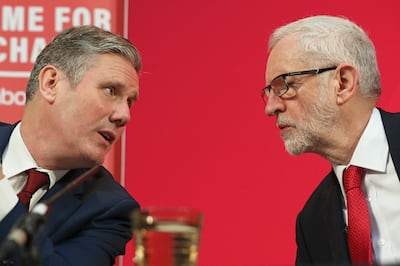After dragging Britain’s Labour Party out of the doldrums, Keir Starmer says he can lead a similar "national renewal" if voters make him the next UK prime minister.
Mr Starmer, 61, hopes an image of grown-up competence will convince the public to choose Labour at July's UK election despite a feeling he lacks charisma or eye-catching policies.
A former lawyer and chief prosecutor for England and Wales, Mr Starmer says “service of our country” is his only motive to challenge Rishi Sunak for No 10 Downing Street.
His willingness to pose with a Union Jack, talk tough on defence and offer safety-first policies can rile up those in his party who miss his hard-left predecessor Jeremy Corbyn.
But after Mr Corbyn led Labour to its worst defeat since 1935, Mr Starmer makes no apologies for, as he puts it, having “returned Labour to the service of working people”.
If he wins a majority on July 4 he would become only the fourth Labour leader after Clement Attlee in 1945, Harold Wilson in 1964 and Tony Blair in 1997 to do so from opposition.
Keir Starmer through the years - in pictures
Named after Keir Hardie, one of Labour’s founding fathers, Mr Starmer likes to say he “grew up working class” with a toolmaker as a father and nurse as a mother.
He studied law at the University of Leeds, but like more than half of Britain’s prime ministers he also has an Oxford background after taking postgraduate legal training there.
From his barrister days he likes to talk about battling corporate giants such as McDonald’s – while saying he was merely doing a lawyer’s duty when he represented extremists such as now-banned group Hizb ut-Tahrir.
When talking tough on crime he invariably mentions a violent criminal or terrorist he put away during his tenure as Director of Public Prosecutions from 2008 to 2013, for which he was knighted.
In 2013 he apologised for the state’s failure to bring paedophile TV star Jimmy Savile to justice, although he was not personally involved and there was outrage when senior Tories used Savile as a slur against him.
Rise in politics
Mr Starmer entered politics at the 2015 election as a Labour MP in north London, where he lives. An Arsenal football fan, he has two children with his wife Victoria.
In the Corbyn years he was a shadow Brexit minister and lobbied for a second referendum on EU membership, although he now says Labour would not seek to rejoin.
After Mr Corbyn’s historic thrashing, Mr Starmer won a three-way leadership contest in 2020, thrusting him into battle with Tory leader Boris Johnson at the height of the Covid-19 pandemic.

Mr Starmer immediately set about shifting Labour to the centre and patching up relations with the Jewish community after Mr Corbyn’s tenure was plagued by anti-Semitism allegations.
He avoided symbolic traps that had felled Mr Corbyn by singing the national anthem and supporting Britain’s nuclear deterrent, and there was praise for his calm, methodical manner in parliament.
March towards power
At times he struggled to land a glove on Mr Johnson, with even friendly Labour voices wondering whether Mr Starmer would be no more than a transitional figure.
But Mr Johnson imploded in a string of ethics scandals, giving Mr Starmer an opening to preach integrity and honesty. Then the Tories blundered again by putting Liz Truss in power for a doomed 49-day experiment in economics.
Labour has enjoyed massive poll leads and a string of by-election victories since, in what supporters see as the safe-hands Starmer strategy bearing fruit.
Sceptics say it has more to do with Conservative chaos than any enthusiasm for Mr Starmer, who is accused by the left flank of making Labour indistinguishable from the government.
With his grey quiff and lawyerly manner, many see him as dull and feel he lacks the aura of Tony Blair, who led Labour to a landslide against a similarly tired Conservative government in 1997.

In trying to make Labour’s manifesto bullet-proof from Tory attacks he has backtracked on policies he once supported, such as scrapping tuition fees and putting £28 billion ($35.64 billion) a year into green investment.
And he has recently faced a revolt from some Labour members over the war in the Middle East, having delayed calls for a ceasefire and suggested Israel was within its rights to cut off water and power from Gaza.
Despite those grumbles, Mr Starmer has maintained Labour’s strong position in the polls and it would be a huge upset if King Charles III does not invite him to form the next government.

He promises a “mission-driven” government with a long-term focus on the economy, health, crime, energy and opportunity, offering a steady hand and "national renewal" in place of chaos.
Echoing Mr Blair, he issued a pledge card of six “first steps” such as revamping border security and recruiting 6,500 teachers that could hand Labour some early wins in government.
In preparation for power he has stepped up his presence on the world stage, holding private talks with Ukraine’s President Volodymyr Zelenskyy and France’s Emmanuel Macron.
Some feel Mr Starmer has played domestic politics on easy mode – but crises from Britain to Gaza would give him the chance to truly show his mettle if he pulls up to Downing Street’s gates in July.
































